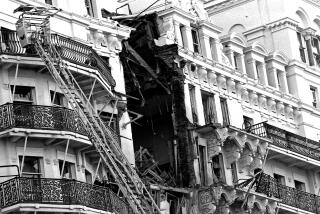Thatcher Hits ‘Trial by TV’ in IRA Slayings
- Share via
LONDON — Prime Minister Margaret Thatcher today attacked a televised documentary that suggested three unarmed Irish guerrillas, killed by British soldiers in Gibraltar last month, were shot in cold blood.
Thatcher stepped into a growing controversy over the documentary, which was shown by commercial network Thames Television on Thursday despite a government plea for it to be postponed until after a Gibraltar inquest is held.
“The place to have trials is a court of law. Trial by television or guilt by accusation is the day that freedom dies,” she told a Japanese television company.
But after a Cabinet meeting in Dublin, the Irish government reiterated its deep concern that “three unarmed Irish people suspected of being involved in serious crime should have been shot dead when it appeared from reports that they could have been arrested by the security forces involved.”
The program, “Death On The Rock,” included an interview with eyewitness Carmen Proetta, who said she saw three men in plain clothes approach Irish Republican Army guerrillas Mairead Farrell, Daniel McCann and Sean Savage on a Gibraltar street.
Proetta said the men opened fire without warning and continued to shoot after their victims collapsed to the ground. Two of the guerrillas had their hands in the air in a gesture of surrender when they were shot.
‘Unresisting Gesture’
“When they saw these men had the guns in their hands, they just put their hands up,” Proetta added. “It was like giving themselves up--an unresisting gesture.”
Foreign Secretary Sir Geoffrey Howe told Parliament after the killings that the guerrillas were shot when they made suspicious movements which led security men to believe their lives were in danger.
The British government said the shooting was a successful mission to thwart an IRA car bombing in the colony.
Howe today condemned the decision to go ahead with the broadcast and said the inquest jury would be profoundly influenced by the documentary, excerpts of which were broadcast by Gibraltar television.
Thames Television said it had received numerous calls about the program, two thirds of which were critical of its decision.
More to Read
Sign up for Essential California
The most important California stories and recommendations in your inbox every morning.
You may occasionally receive promotional content from the Los Angeles Times.








